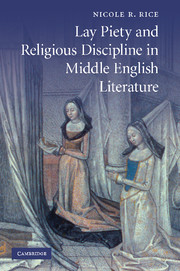Book contents
- Frontmatter
- Contents
- Preface
- Acknowledgments
- Abbreviations
- Introduction
- Chapter 1 Translations of the cloister: regulating spiritual aspiration
- Chapter 2 Dialogic form and clerical understanding
- Chapter 3 Lordship, pastoral care, and the order of charity
- Chapter 4 Clerical widows and the reform of preaching
- Conclusion: Spiritual guides in fifteenth-century books: cultural change and continuity
- Notes
- Bibliography
- Index
- CAMBRIDGE STUDIES IN MEDIEVAL LITERATURE
Chapter 1 - Translations of the cloister: regulating spiritual aspiration
Published online by Cambridge University Press: 30 June 2009
- Frontmatter
- Contents
- Preface
- Acknowledgments
- Abbreviations
- Introduction
- Chapter 1 Translations of the cloister: regulating spiritual aspiration
- Chapter 2 Dialogic form and clerical understanding
- Chapter 3 Lordship, pastoral care, and the order of charity
- Chapter 4 Clerical widows and the reform of preaching
- Conclusion: Spiritual guides in fifteenth-century books: cultural change and continuity
- Notes
- Bibliography
- Index
- CAMBRIDGE STUDIES IN MEDIEVAL LITERATURE
Summary
In the late fourteenth century the religious orders, with their textually mandated forms of ritual regulation and ordered meditation, maintained privileged claims on earthly contemplation and eternal salvation. They continued to garner the respect of many laypeople who pursued the “spiritual life” through affiliation with them. But relatively few laypeople could seek the rewards of the cloister by combining the practices of emulation and devotional reading considered above. Perhaps they lacked the means to enter into confraternity or were unable to retire; perhaps they did not have the time or patience to sort through the lengthy Latin programs of the books of hours. Sensing a demand for new texts of spiritual advice, a number of clerical authors addressed the demands of lay piety by translating the most iconic structures of monastic life (rule and cloister) into literary form for the guidance of lay readers.
If linguistic translation responds to what Roger Ellis calls “a perceived intellectual/cultural lack, which the translator hopes the translation will make good,” then these spiritual rules respond to a perceived lack of appropriate guidance material for pious laity. In this chapter 1 consider two guides, The Abbey of the Holy Ghost and Fervor Amoris, which encourage their lay readers to imagine themselves part of an order of spiritually committed laypeople, while recognizing that the transformation of laypeople's internal, spiritual status could have implications for the transformation of external social and religious roles.
- Type
- Chapter
- Information
- Publisher: Cambridge University PressPrint publication year: 2009



